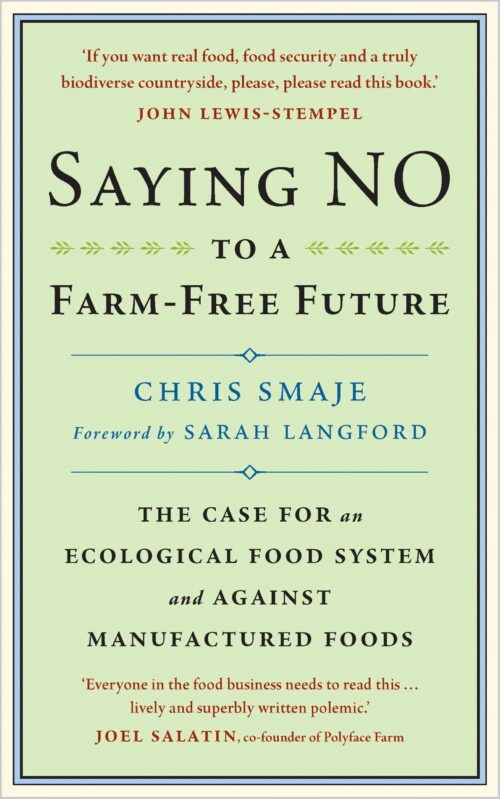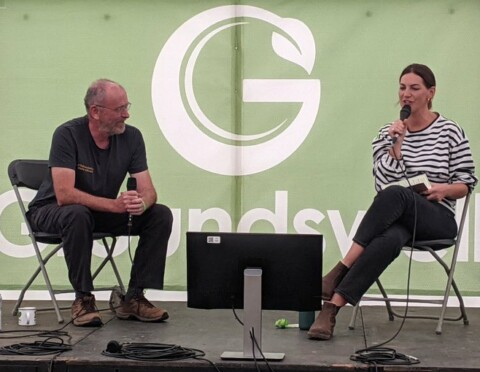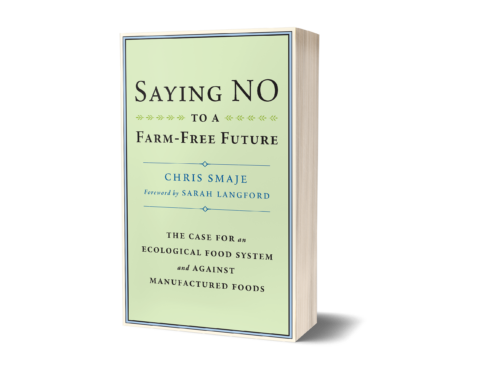

Formats available: Paperback, Ebook, Audiobook
First published: 28/06/23

My new book, critiquing food techno-fixes and making the case for local food systems
The Case for an Ecological Food System and Against Manufactured Foods
One of the few voices to challenge The Guardian‘s George Monbiot on the future of food and farming (and the restoration of nature) is academic, farmer and author of A Small Farm Future Chris Smaje. In Saying NO to a Farm-Free Future, Smaje presents his defense of small-scale farming and a robust critique of Monbiot’s vision for an urban and industrialized future.
Responding to Monbiot’s portrayal of an urban, high-energy, industrially manufactured food future as the answer to our current crises, and its unchallenged acceptance within the environmental discourse, Smaje was compelled to challenge Monbiot’s evidence and conclusions. At the same time, Smaje presents his powerful counterargument – a low-carbon agrarian localism that puts power in the hands of local communities, not high-tech corporates.
In the ongoing fight for our food future, this book will help you to understand the difference between a congenial, ecological living and a dystopian, factory-centered existence. A must-read!
“Chris Smaje has laid down an indictment – as unremitting as it is undeniable – that cuts through the jargon-filled, techno-worshipping agricultural futurists who promise silver-bullet fixes for having your cake and eating it too. This brilliant and compelling book is at once hopeful and persuasive about the future of food.”—Dan Barber, chef at Blue Hill and author of The Third Plate
If you would like to share your thoughts on this book, please comment on this post
Formats available: Paperback, Ebook, Audiobook
First published: 28/06/23
“Chris Smaje provides a comprehensive and reasoned counter to George Monbiot’s Regenesis, politely demolishing Monbiot’s ecologically naïve belief that urban dwellers can subsist on food manufactured by corporations, presumably without the use of fossil fuel energy. Smaje’s deeper, more global coverage of the social, cultural, economic and environmental realities of the agricultural dilemma raises issues that no one can afford to ignore. Without agriculture, we cannot have an orchestra, church, economy, city or any business. It is the foundation of civilisation under global threat of climate change.”
Allan Savory, author of Holistic Management
“This book is the much-needed antidote to the crazy excesses of ecomodernism in all its guises. A paean to sanity and to humanity’s reconnection with the living planet, this is essential reading for anyone who wants to understand how we can move beyond the industrial paradigm to something that is actually regenerative; for anyone who wants to know how we can feed ourselves without recourse to fantasy fuel sources or further empowerment of the see-want-take value systems pushed by the multinationals and their outriders. It’s essential reading, really, for anyone who eats, but most especially for farmers and growers and anyone involved in the creation of policy, at whatever level.”
Manda Scott, author of the Boudica: Dreaming series and host of the Accidental Gods podcast
“Chris Smaje has long been a powerful, humane and practical thinker on our relationship to land and farming. This book is a powerful, well-argued and convincing rejection of the ‘ecomodern’ theology currently being promoted by leading British greens. In a time of great division, Smaje offers a human-scale and heartfelt alternative to elite green technocracy.”
Paul Kingsnorth, author of Confessions of a Recovering Environmentalist
“This is a much-needed book – and Chris Smaje is exactly the person to write it. He builds his case with care and humility, highlighting the gaps in the evidence used by advocates of a ‘farm-free’ future, but also bringing into view the assumptions that are hidden behind their loud insistence that ‘you can’t argue with arithmetic’. For anyone disoriented by the ecomodernist turn in environmentalism, this is a book that will help you find your bearings.”
Dougald Hine, author of At Work in the Ruins
“Chris Smaje’s devastating critique of the farm-free future projected by ecomodernists is also an intriguing forecast of what Lewis Mumford in The City in History called the ‘end of the megalopolitan cycle’, and an eloquent appeal for reruralisation.”
Simon Fairlie, author of Going to Seed
“A real powerhouse of a book. Chris meticulously disentangles the case for a future of our food being grown in laboratories for what it really is: energy intensive, corporate driven and lacking resilience. His justification for a mixed small-scale farming landscape, for a nature-rich, job-rich and food-rich world, is not just convincing for the betterment of our collective economic, social and environmental health, it’s really humanity’s only hope to restore our connection to this planet, and heal.”
Lynn Cassells, coauthor of Our Wild Farming Life
“How do those raised in a culture of separation from nature, with abundant exosomatic energy from fossil fuels and vast transportation networks, develop the knowledge, skills, and new culture that draws from the past while preparing for a very different future? It would be nice if more of us were asking this question and seeking answers, and although it is a shame George Monbiot isn’t helping us out here, I am sure glad Chris Smaje is.”
https://www.resilience.org/stories/2023-06-30/review-saying-no-to-ecomodermism-smaje-versus-monbiot-its-no-contest/
“Who needs to read Saying No to a Farm-Free Future? Anyone thinking that the ecomodernist prescription might be a good idea; and anyone arguing with ecomodernists and looking for data to back up their feeling that “food” factories in megacities is not the best path.”
https://www.resilience.org/stories/2023-07-03/saying-no-to-a-farm-free-future-by-chris-smaje/
Smaje’s analysis and arguments are carefully reasoned and walked through. We would not necessarily agree with everything suggested in this book, but Smaje does argue reasonably and with the intent to be fair and draw on legitimate sources. This book is definitely thought provoking, even if we found the title a bit clunky. We liked it, and would recommend reading it.
https://irishtechnews.ie/saying-no-to-a-farm-free-future-reviewed/
Saying NO to a Farm-Free Future makes a solid case for agrarianism, which falls in line with the arguments of Gene Logsdon, Wendell Berry, and others sympathetic to the Mad Farmer’s Liberation Front. The opponent, in this case, is not status-quo agribusiness, but a similar technocratic model wearing new clothes.
https://www.frontporchrepublic.com/2023/09/hope-for-a-humane-agricultural-future-a-review-of-saying-no-to-a-farm-free-future/
https://earthbound.report/2023/09/11/saying-to-to-a-farm-free-future-by-chris-smaje/
“Written as a meticulous but respectful response to ecomodernist journalist George Monbiot’s 2022 book Regenesis, Smaje’s book presents a convincing (and equally scientifically referenced) alternative to Monbiot’s focus on manufactured food and vast rewilding as a solution to wildlife loss and food security.”
https://www.resurgence.org/magazine/article6255-back-into-the-hands-of-the-small.html
https://vetsalus.com/news/2024/01/book-review-saying-no-farm-free-future-chris-smaje
“We are heading to hell in a techcart driven by the unlikely twins of Extremist Rewilding and Big Food; if we don’t pull on the brakes sharpish, our countryside will be reduced to a monoculture of lynxy scrub and our food grown in vats. If you want real food, food security and a truly biodiverse countryside, please, please read this book. “
John Lewis-Stempel, author of Meadowland
“Everyone in the food business needs to read this book. If you think the future rests in time-tested local authenticity, Smaje’s arguments sound like affirming angels. If you think the future lies in techno-sophisticated urban manufacturing plants, you owe it to yourself to learn the best arguments from the opposing view.
For many of us in the local authentic food space, George Monbiot is our nemesis in the public debate of food’s future. Will it be local, democratised and heritage driven, or will it be manufactured by techno-sophisticates suddenly converted to humble, charitable ends? Smaje cuts precisely and directly, eviscerating Monbiot with superb and quotable verbalese.
Never have I enjoyed reading a blow-by-blow narrative as much as this lively and superbly written polemic.”
Joel Salatin, co-founder of Polyface Farm, and author of You Can Farm and Polyface Micro
“Chris Smaje’s Saying NO to a Farm-Free Future is a timely response to those who are constructing a dystopia of farms without farmers, food without farms, while promoting more industrialisation of the food system. Farming with care on a small scale is the path of ecological regeneration and returning to the earth. Thank you, Chris, for writing this important book for all of us.”
Vandana Shiva, activist and author of Terra Viva
“A thought-provoking, intelligent response to George Monbiot’s Regenesis. As the author remarks, this is a provocation to thought rather than a summation of the truth. Setting out the principles of good agriculture that can have benefits to people, land and nature. A case for a rural agricultural landscape that delivers food without wrecking the planet. Agrarian localism as an alternative that may succeed given present challenges on alternative land use.”
Jake Fiennes, author of Land Healer
“Chris Smaje shows us that it is people, working in communities and in tune with their local environment, who can provide answers to our food, energy and climate questions. In Saying NO to a Farm-Free Future, Chris has written an intelligent and absorbing analysis of a complex problem, and one that should be essential reading for us all.”
Hunter Lovins, founder of Natural Capitalism Solutions and author of A Finer Future

I’m going to continue my present mini-theme concerning emerging class conflicts around agrarian localism with a few words about current antipathies between farmers and ‘experts’. This suggested itself to me during some sessions at the Groundswell Festival, where my new book was launched. One of those sessions was called ‘There …
Read more
I’m not the most enthusiastic of public speakers – I prefer public writing, which I find a better medium for crafting what I want to convey. When I have spoken in public, I’ve opted mostly to address sympathetic audiences likely to be receptive to my words. Sometimes, this has invited …
Read more
Before I wade into blogging about my new book Saying NO to a Farm-Free Future, I’d like to take a step back and try to characterize some of the broader political contours that have now put me in a different camp to George Monbiot, the main antagonist in my book, …
Read more
I’ll be in discussion with Vandana Shiva about ‘The War on Farming’ at an event in London next Tuesday. Come along if you can. Should be an interesting conversation. There’s certainly plenty to talk about, because it does seem to me there’s quite a concerted media effort underway to point …
Read more
I’m guessing that few people the world over will have failed to notice the big-ticket news items last week – most importantly, the official launch of my new book Saying NO to a Farm-Free Future at the Groundswell Festival in Hertfordshire, and secondly the release of the 2022 global energy …
Read more
UK publication day is nigh for my new book Saying NO to a Farm-Free Future: The Case for an Ecological Food System and Against Manufactured Foods. I’ll be blogging about it here over the next couple of months and as ever welcome constructive debate. I’m unlikely to be debating it …
Read more
Time for a quick update on climate protest from your correspondent somewhere quite a long way behind the frontline, but still closer than you’ll read in the average news report. Then I’m going to bring it all back home before relating it to the present concerns of this blog around …
Read more